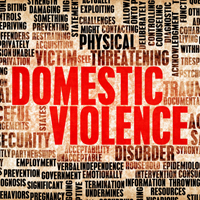 Domestic violence includes any number of attacks on a person with whom the attacker has an intimate or familial relationship. The most commonly understood version includes a husband forcibly striking his wife. But this conduct is only one aspect of the crime.
Domestic violence includes any number of attacks on a person with whom the attacker has an intimate or familial relationship. The most commonly understood version includes a husband forcibly striking his wife. But this conduct is only one aspect of the crime.
Domestic violence is a pattern of behavior used by one intimate partner against another to maintain, gain, or regain power in the relationship. It can involve any individual or combination of physical, sexual, and psychological attacks, as well as economic coercion. The conduct can be with anyone living in the same home that is related by blood or marriage. The term can even include people in a dating relationship.
Increasing Awareness
The problem has been the subject of awareness campaigns for many decades. Beginning in 1981 the National Coalition Against Domestic Violence hosted a “Day of Unity” to connect advocates working to end violence against women and their children. Over time the event evolved into a week devoted to activities to mourn those who have died because of domestic violence, celebrate those who have survived, and connect those working to end violence.
In 1989, Congress passed Public Law 101-112 designating October as National Domestic Violence Awareness Month that year. Ever since, the month of October has been re-designated as such.
Signs of Abuse
If you are afraid of your partner or someone related to you, chances are you are the victim of some form of domestic violence.
Abusers share behaviors that are designed to control or intimidate. These often include:
- Accusations of infidelity
- Blaming you for the abuse
- Criticizing you frequently
- Keeping you from accessing cash or credit cards
- Tracking all of your spending
- Preventing you from working
- Keeping close track of where you are and who you are with
- Embarrassing you in front of others
- Preventing you from eating, sleeping, or getting medical attention
- Forcing you to have sex
- Physically punching, pushing, or kicking you.
Getting Help
Domestic violence tends to escalate. This can lead to tragic results. Do not try to stick it out. If you are the victim, or think you may be a victim, contact the National Domestic Violence Hotline at 1-800-799-7233. Counselors there can answer questions and provide information on how to gain access to safe houses and other support services.
You may need to get a restraining order against the abuser. However, this alone may not be enough protection. It might be necessary to plan an unexpected exit, and to stay in an undisclosed safe place while you pursue your legal options.
Domestic Violence and Divorce
Questions about the impact of domestic violence and divorce can best be answered by talking to an experienced domestic violence lawyer with a background in family law. The issues are multifaceted, and will impact how determinations are made regarding alimony, child support, and division of property.
Evidence of domestic abuse will need to be evaluated and addressed in any child custody decisions. All parents and legal guardians have a legal responsibility to provide for their children. That responsibility does not disappear if a domestic abuser loses custody.
Contact a Towson Domestic Violence Lawyer at Huesman, Jones & Miles, LLC For Legal Assistance
Domestic violence is a crime with legal consequences. Do not simply accept your spouse or other family member’s violence. Allow one of our experienced Towson domestic violence lawyers at Huesman, Jones & Miles, LLC listen to your concerns and help prepare a legal defense to get you protection and justice. Call 443-589-0150 or contact us online for a free initial consultation. Located in Towson, Maryland, we represent clients in Baltimore County, including Monkton, Sparks and Parkton, as well as throughout Maryland.






